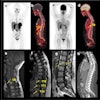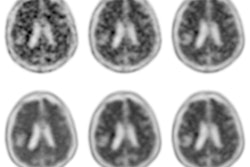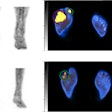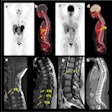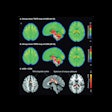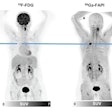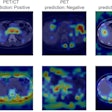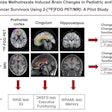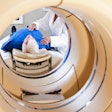
Clinical anxiety may increase the risk of cognitive decline in people with early signs of Alzheimer's disease on PET scans with the Pittsburgh compound B (PiB) radiotracer, according to research published December 8 in Alzheimer's & Dementia: The Journal of the Alzheimer's Association.
A group of U.S. and European researchers analyzed data from cognitively normal people with and without anxiety or signs of beta-amyloid accumulation on PET brain scans. Among participants with beta-amyloid plaque, those with anxiety were significantly more likely to develop mild cognitive impairment (MCI) over five years compared with those without anxiety, they found.
"The findings show the clinical importance of anxiety in preclinical Alzheimer's disease," wrote corresponding author Dr. Yonas Geda of the Barrow Neurological Institute in Phoenix.
PET imaging to identify beta-amyloid plaque in the brain is a primary tool for diagnosing Alzheimer's disease. For reasons yet to be fully understood, beta amyloid forms clumps in the brain that lead to the death of nerve cells, and thus cognitive impairment. Moreover, research shows that beta-amyloid deposits can precede clinical symptoms of Alzheimer's disease by up to 20 years.
Previous work by the authors of this study has shown that anxiety can play a role in cognitive decline, yet few large-scale, longitudinal studies have investigated the association between anxiety, beta-amyloid deposits on PET imaging, and cognitive impairment, according to the researchers.
The group culled data from 1,440 cognitively unimpaired people over 50 years old who began participating in a study established by researchers at the Mayo Clinic in the Rochester, Minnesota, in 2014. Participants underwent baseline neuropsychological testing, self-reported Beck Anxiety Inventory (BAI) tests, and PET imaging using a Pittsburgh compound B (PiB) radiotracer.
Participants were followed for a median of 5.5 years. Elevated plaque levels were defined as PiB standardized uptake value (SUV) ratios of 1.48 or higher. MCI was based on a validated Clinical Dementia Rating (CDR) scale that considers the following criteria:
- Cognitive concern expressed by a physician, informant, participant, or nurse
- Impairment in one or more cognitive domains (executive functions, memory, language, or visuospatial skills)
- Essentially normal functional activities
- Absence of dementia
The analysis showed that beta-amyloid deposits increased the risk of MCI independently of anxiety. However, PiB-positive participants with clinical anxiety (BAI ≥ 10) had an almost sevenfold increased risk of developing MCI, whereas being PiB-positive without clinical anxiety was associated with double the risk. Having clinical anxiety and being PiB-negative was not associated with an increased risk of MCI on a statistically significant basis, the researchers found.
"Clinical anxiety modified the association between [beta amyloid] and risk of mild cognitive impairment in cognitively unimpaired individuals," the authors wrote.
Importantly, the researchers also included measures of depression in the study and found no associations similar to those between anxiety, amyloid plaque, and cognitive impairment, despite suggestions from previous studies.
The authors included researchers from Austria, Germany, and the Czech Republic. They noted that the associations they discovered between clinical anxiety and risk of cognitive decline are not necessarily etiologic associations, but they said that studies like this involving biomarkers on PET imaging are crucial for paving the way to understand the mechanism linking anxiety with risk of Alzheimer's disease.
"More research is needed to examine whether early treatment of anxiety in individuals at high risk for [Alzheimer's disease] might contribute to prevention or delay of [the disease]," the group concluded.


